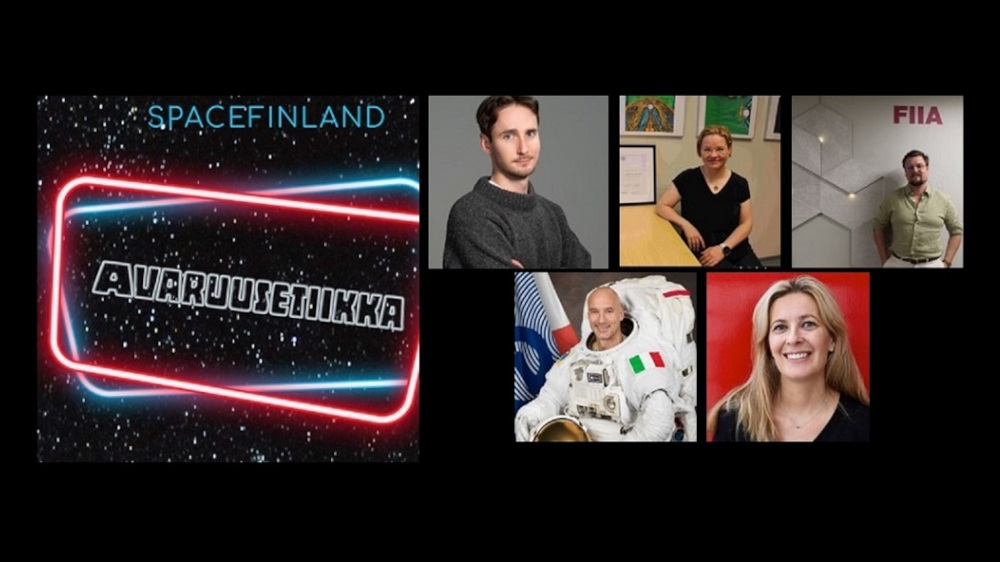
Ethics – an integral part of space activities
As an intern in the space team of the Ministry of Economic Affairs and Employment, I got an unforgettable insight into the Finnish space domain – my personal highlight was to conduct an interview series on space ethics.
I have been interested in space ever since I was a child — in primary school, I listened to Stephen and Lucy Hawking's audio book “George’s Secret Key to the Universe” again and again. Visits to the Urania observatory in my hometown Zurich further fueled my interest in space. One night, the AGUZ (Astronomic Society Urania Zurich) organized a hike on Zurich’s “Planet Trail”, which winds along planetary models on the ridge of the Uetliberg mountain. Above the city lights, a spectacular view unfolded into the night sky – with the help of the guide, we could even catch a glimpse of the International Space Station racing on its orbit.
Today, I study philosophy and English at the University of Zurich, where I have grown up in a Swiss-Finnish family. Last year, I had the chance to spend an exchange year in Helsinki, after which I wished to gather some working experience in Finland. In spring, I was excited to hear that I could spend the summer as a communications intern in the space team of the Ministry of Economic Affairs and Employment.
It was not about alien communication
I had already heard that Finnish space startups were at the forefront of international space activities, but was surprised to learn that Finland’s space administration was that established. As the internship started, a fascinating journey into the Finnish space sector began, and I got to look up concepts such as “decentralised space administration” or “space situational awareness”.
At the beginning of the internship, I had the chance to participate in SGAC Finland’s (Space Generation Advisory Council) networking event, where I got to meet many young space professionals and students. As I shared my first impressions of my internship with a few other participants, one of them asked in disbelief: “Are you really working on alien communication?” Indeed – this is also a legitimate interpretation of space communication. As interesting as it sounds, I was also very excited to start working on an interview series on space ethics.
Space ethics – science fiction?
At first, space ethics seemed very abstract, and the research by Oskari Sivula on the ethics of terraforming Mars or the enhancement of astronauts sounded almost like science fiction. I only realized how current space ethics is already, as I started to grasp the extent to which our everyday life relies on the space sector.
Space is part of our daily lives in the form of spatial data services, weather forecasts and telecommunications. As such, the space domain is tied to various sectors of society and engages various actors, who represent a wide range of interests. At times, these interests may conflict. Space ethics is needed to reconcile these conflicts. According to Oskari Sivula, one of the key tasks of space ethics is to “examine and weigh the partly conflicting interests and values guiding space activities”.
Insights from theory and practice
For the space ethics series, I wanted to interview both researchers and other space professionals, to include both theoretical and practical perspectives. I wanted to start the series with an interview with Oskari Sivula on space ethics as a scientific discipline. I then wanted to discuss space sustainability with Minna Palmroth, director of the Finnish Centre of Excellence in Research of Sustainable Space. Next, I would interview researcher Markus Holmgren on the role of space for the great power competition. I also wanted to discuss the ethics of space legislation with space lawyer Jenni Tapio.
As Luca Parmitano, astronaut with the European Space Agency, visited Helsinki in October, I had the chance to interview someone who had been in space himself – the topic of this interview naturally became “ethics of spaceflight”.
What justifies space activities when we should focus on our home planet?
A core theme of space ethics concerns the justification of space activities: is it right to invest enormous sums in space activities when we are facing acute crises on our own planet? Minna Palmroth’s view on that matter was particularly interesting – she argued that the Earth’s sustainability would be the most important motive to promote space activities today: “The Earth's carrying capacity requires the adoption of green and digital transitions, the success of which relies heavily on space activities. The maintenance of digital infrastructure, for instance, is highly dependent on satellites.”
Ethics is reflected in space legislation
Minna Palmroth also pointed out that space actors of today have an obligation to “minimize adverse effects of unsustainable space activities”. These may include preventing other actors from entering space or exposing them to space-originating risks.
In practice, this means that we have to remove old satellites and any other space debris from the orbits. This is already captured in the Finnish space legislation, which requires space actors to draft a debris removal plan already when applying for their operation license. Space lawyer Jenni Tapio commented that “Finland's space legislation may be considered progressive in international comparison”.
Space raises fundamental ethical questions
Space legislation is a very effective way to implement ethical principles. However, the drafting of space legislation is itself subject to various ethical challenges – Jenni Tapio argued that space legislation is inevitably anthropocentric, bound to a human-centered perspective: “Our way of structuring our environment has evolved under certain circumstances. Can our values also be generalised to radically different circumstances?”
Whether we can extend our values beyond our home planet ultimately raises one of the most central ethical questions: are there such things as universal ethical facts? Along the same line, Oskari Sivula compared space ethics to a mirror, against which we may reflect our values and hopefully even yield new perspectives on other ethical problems as well.
From outer space, the Earth looks fragile
The contingency of our values was also a topic in the interview with astronaut Luca Parmitano, in which he recalled the “overview effect” – an often life-changing experience reported by many astronauts upon seeing the Earth from outer space.
“Becoming aware of the fragility of the Earth gave me a strong sense of responsibility”, Parmitano said and recalled that from space, the Earth almost looked like a breathing organism. The overview effect shows how space can help us to recognize our place on Earth and that space can serve as a powerful source of inspiration.
Finland – a pioneer in ethical space activities?
According to Oskari Sivula, research on space ethics is only just gaining traction in Finland. In hindsight, this seems surprising, as I got the impression that Finland would have engaged with space ethics for much longer – all interviewees had answers to questions which can be considered to fall within the scope of space ethics.
I further got the impression that Finland is committed to promoting space activities on sound ethical grounds. The fact that the space team of the Ministry of Economic Affairs and Employment encouraged the realization of this interview series strengthened my impression that there is a broad resonance for space ethics. A strong effort is also already being made to address ethical challenges on a concrete level, for example by the Finnish Centre of Excellence in Research of Sustainable Space.
Even though Finland is not among the world's biggest space actors, it can still shape the progress of global space activities. Jenni Tapio emphasized that Finland's international influence shouldn’t be underestimated: in the UN Committee on the Peaceful Uses of Outer Space, for example, decisions are made according to a “one member, one vote” principle. There, Finland's voice weighs as much as the United States’, which researcher Markus Holmgren considers to be the current superpower in space. Further, Finland has established itself as an internationally viable space actor – as a forerunner in ethical space activities, Finland could thus considerably influence the course of global space activities.
(Photo sources: Oskari Sivula, ESA, Jenni Tapio, Anna-Sofia Schaller)
Explore the interview series on space ethics:
Oskari Sivula: A new scientific discipline is on the horizon in Finland: space ethics is on the rise
Minna Palmroth: “We have an obligation to minimize the adverse effects of unsustainable space activities”
Markus Holmgren: “Space reflects great power politics in its most authentic form”
Luca Parmitano: ”If we can think about something, it is also possible”
Jenni Tapio: Who does space belong to?





